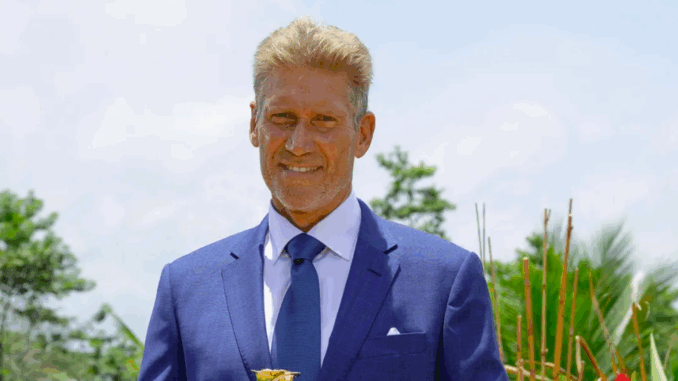
Gerry Turner captured America’s heart as the first-ever Golden Bachelor. With his warm smile, tearful sincerity, and gentle charm, the 72-year-old widower seemed like the perfect romantic lead for a reality series redefining what love could look like later in life. But while his journey began as a fairy tale, it ended in ways far more complicated—revealing the messiness of love, grief, and new beginnings in the public eye.
From heartbreak to hope, and eventually controversy, Gerry’s story became something far more nuanced than anyone expected.
The Perfect Lead—Or So It Seemed
When ABC introduced Gerry Turner as the Golden Bachelor, he was painted in soft-focus: a retired restaurateur from Indiana, a devoted father and grandfather, and a man still mourning the loss of his beloved wife, Toni. His emotional retelling of their love story in the premiere episode left viewers sobbing—and firmly rooting for him.
He wasn’t a reality TV archetype. He was a man who had loved deeply and lost painfully. And now, he was daring to believe he could love again. It was brave. It was relatable. It was, for many, inspiring.
Gerry’s vulnerability was his greatest strength. As he dated the women of the show, he cried, laughed, and opened up in ways rarely seen from male leads in the franchise. He listened. He asked thoughtful questions. And when he said he was looking for a “partner for the rest of his life,” it felt like more than just a tagline.
A Love Triangle with Real Consequences
As the season progressed, it became clear Gerry had genuine connections with more than one woman—namely, Faith Martin and Leslie Fhima. With both, he shared intimate moments, tearful confessions, and declarations that suggested lasting feelings. That emotional honesty, however, soon blurred into confusion.
In the show’s final episodes, fans were shocked when Gerry told both women he loved them—an action typically reserved for younger leads in the flagship series. The difference? These were not starry-eyed 20-somethings. These were women who had loved and lost, and whose emotional stakes were sky-high.
Ultimately, Gerry chose Theresa Nist, a warm and compassionate financial services professional from New Jersey. He proposed in the finale, and Theresa accepted with grace. It was supposed to be the happy ending everyone had been waiting for.
But the story didn’t end there.
The Post-Show Backlash

After the cameras stopped rolling, cracks began to appear. Fans started questioning Gerry’s narrative, especially after The Hollywood Reporter published an exposé detailing parts of his past that had not been shared on the show—including a long-term relationship he’d allegedly had just months after his wife’s passing.
The revelation was jarring. Many viewers who had been moved by his grief now felt misled. The storybook image of the lonely widower searching for a second chance began to fade.
Then came the wedding.
ABC aired The Golden Wedding in January, where Gerry and Theresa tied the knot in a lavish televised ceremony. But by April, just three months later, the couple announced they were divorcing.
They cited long-distance logistics—Gerry lived in Indiana, Theresa in New Jersey—and the difficulty of merging lives at their age. But for many fans, the rapid unraveling of what was sold as a forever love felt like betrayal.
What Went Wrong?
In the aftermath, critics and fans alike debated whether The Golden Bachelor had set up unrealistic expectations. Was it fair to expect a widower to fall in love on a deadline? Did the show rush into an engagement to force a fairy tale ending?
Gerry, for his part, handled the backlash with characteristic calm, though his media appearances became more measured. He maintained that his love for Theresa was genuine, and that their decision to part was mutual and respectful.
Still, the disappointment was palpable. Viewers who had invested emotionally in his journey now felt conflicted—torn between empathy and disillusionment.
Lessons in Late-Life Love
Despite the controversy, Gerry’s story opened a rare conversation in mainstream media: what does dating look like after decades of marriage? What does “forever” mean when you’re in your seventies? And is it fair—or even wise—to expect the same romantic blueprint for people at different stages of life?
Gerry’s missteps, though frustrating for some, were deeply human. He was a man navigating the chaos of grief, guilt, and public expectation while trying to protect his heart. In the end, his choices weren’t perfect—but they were real.
He reminded viewers that love is rarely simple, especially when shaped by loss.
Conclusion: The Man Behind the Myth
Gerry Turner will always be The Golden Bachelor. But perhaps his legacy isn’t the failed romance or the media backlash—it’s that he showed up. He let the world watch him try. He opened himself to connection and criticism alike. And even when the story didn’t go as planned, it still made millions reflect on their own relationships.
Love after loss is never neat. But as Gerry showed us, it’s still worth chasing—even if the ending isn’t the one we expected.